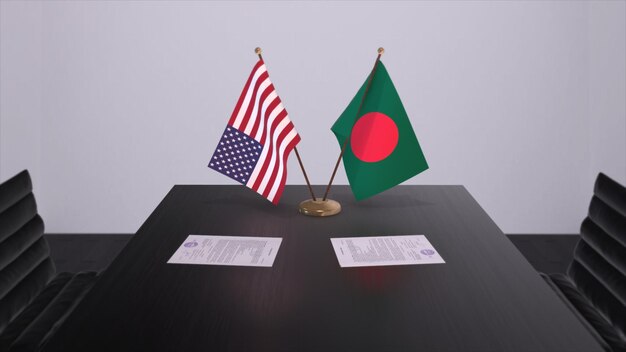Rafikul Islam
Published:2025-07-09 03:59:38 BdST
Swift negotiations urged as US tariff hike threatens export edge
As the United States prepares to impose a steep 35% tariff on Bangladeshi goods from 1 August 2025, trade experts and business leaders are urging Dhaka to engage in urgent, strategic negotiations to avert potentially devastating consequences for the country's export economy, especially its vital ready-made garments (RMG) sector.
Economists warn that without swift and skilled diplomacy, the punitive tariff could erode Bangladesh’s competitiveness in its largest export market, threaten hundreds of thousands of jobs, and derail the country’s fragile post-LDC graduation trajectory.
The US administration’s move comes after Bangladesh failed to finalise a tariff agreement before the 9 July deadline. While Washington has offered a further 20-day window for dialogue, analysts warn that this final opportunity must be used wisely.
Dr Selim Raihan, executive director of SANEM, described the imposition of the 35% reciprocal tariff as a serious economic setback, stemming from a unilateral decision by the United States.
“The RMG sector, in particular, will suffer the most. Previously, we had to pay an average of 15% duty. This will now more than double," he said.
"Consequently, it will become increasingly difficult for Bangladesh’s main export products to remain competitive on price in the US market," he added.
He further emphasised, “With global trade policies evolving rapidly, Bangladesh must act swiftly, strategically, and with a multifaceted approach. Any delay will exacerbate our economic vulnerabilities and diminish our prospects.”
Dr Mahfuz Kabir, research director at the Bangladesh Institute of International and Strategic Studies (BIISS), echoed similar sentiments.
He said, “we have not taken any concrete action in the past three months to reduce tariffs. Though the US has left room for negotiation, the proposals we presented, such as increasing imports from the US or lowering non-tariff barriers, did not appear attractive to them. As a result, we received only a marginal 2% concession.”
He added, “The US has granted us an additional 20 days for discussions. We must utilise this opportunity. Unfortunately, negotiation has never been our strength. Had we responded more seriously when the US first indicated its intentions, we might have avoided this situation.”
Former vice president of the Federation of Bangladesh Chambers of Commerce and Industry (FBCCI) Abul Kasem Haider noted that the tariff hike from 15% to 35% will certainly affect US buyers.
“The increased duty will discourage purchases, and ultimately, the impact will fall on our exports,” he said.
He also criticised the rushed efforts to graduate from the Least Developed Country (LDC) status, suggesting that flawed data from a previous government had led to unrealistic timelines.
“We need more time to prepare for LDC graduation, or we will face even more such challenges in the future,” he cautioned.
Abul Kasem further advised market diversification, stressing that the US tariff will not directly affect other export destinations. “Now is the time for Bangladeshi exporters to actively seek new markets. Otherwise, we may repeatedly face similar obstacles.”
He also pointed to the importance of democratic legitimacy, stating, “An elected government is crucial to attracting foreign direct investment (FDI), securing industrial development, and generating employment.”
Syed Ershad Ahmed, President of the American Chamber of Commerce in Bangladesh (AmCham), clarified that the US President’s letter to Chief Adviser Dr Muhammad Yunus is not a final declaration.
“There is still scope for discussion. According to the letter, the 35% tariff will be enforced from 1 August 2025. So we do have some time left. Everything now depends on how effectively our representatives negotiate,” he said.
Syed Ershad emphasised the need for technical expertise in the negotiations, citing issues such as non-tariff barriers, labour conditions, and intellectual property rights.
“Negotiation skills are critical. Bangladesh could have prepared a formal proposal in coordination with AmCham, FICCI, and BGMEA for meetings in the US. I am unaware if any such coordinated effort is underway, though I was invited to earlier discussions held in Dhaka.”
Mahmud Hasan Khan, president of the Bangladesh Garment Manufacturers and Exporters Association (BGMEA), acknowledged that the higher tariff poses a serious threat to the RMG industry.
“We had expected a tariff rate between 10% and 20%, and we anticipated that Chief Adviser Muhammad Yunus would raise this matter with the US government,” he said.
Former BGMEA director Mohiuddin Rubel called the US tariff “non-systematic and unfortunate,” expressing concern over job losses and export contraction.
“The US is our primary export market. Bangladesh must act swiftly – engaging US importers, resuming high-level trade talks, and highlighting the value of our products – to advocate for policy changes,” he suggested.
The US President had earlier announced elevated tariffs on over 100 countries on 2 April, including an additional 37% on Bangladesh. The new 35% tariff were announced on Monday after a three-month grace period expired. The average tariff on Bangladeshi products had previously stood at 15%.
In a bid to reduce its trade deficit with the US and pave the way for dialogue, the Bangladesh national budget introduced tariff exemptions on 626 products, 110 of which now enjoy complete duty withdrawal. The government has also indicated its willingness to increase imports from the United States.
Commerce Secretary Mahbubur Rahman stated, “We expect to hold a meeting with the US on 10 or 11 July. The commerce adviser will attend, and I will be present as well. We only learned of the new tariff announcement this morning and will consult stakeholders before deciding the next steps.”
He also mentioned that the tariff proposal emerged even as efforts were being made to reach a mutual understanding.
Over the past three months, Bangladesh has engaged in 26 rounds of discussions, both virtual and face-to-face, with US officials.
“Despite our strong performance in the US market and proactive engagement, no major breakthrough has been achieved,” he earlier said.
“We remain hopeful, but ultimately, the decision rests with the US government.”
Unauthorized use or reproduction of The Finance Today content for commercial purposes is strictly prohibited.


